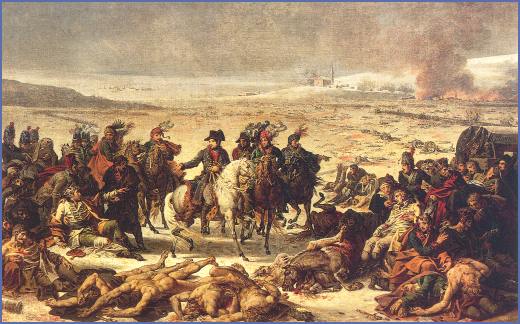
Post Battle

"So up I got to look around and contemplate a battle-field by the pale moon-light. The night was serene and pretty clear; a few light clouds occasionally passing across the moon's disc, and throwing objects into transient obscurity, added considerably to the solemnity of the scene. Oh, it was a thrilling sensation thus to stand in the silent hour of the night and contemplate that field all day long the theatre of noise and strife, now so calm and still-the actors prostrate on the bloody soil, their pale wan faces upturned to the moons cold beams, which caps and breastplates, and a thousand other things, reflected back in brilliant pencils of light from as many different points! Here and there some poor wretch, sitting up amidst the countless dead, busied himself in endeavors to stanch the flowing stream with which his life was fast ebbing away. Many whom I saw so employed that night were, when morning dawned, lying stiff and tranquil as those who had departed earlier. From time to time a figure would half raise itself from the ground, and then, with a despairing groan, fall back again. Others, slowly and painfully rising, stronger, or having less deadly hurt, would stagger away with uncertain steps across the field in search of succor. Many of these I followed with my gaze until lost in the obscurity of distance; but many, alas after staggering a few paces, would sink again on the ground, probably to rise no more. It was heart-rending-and yet I gazed! Horses, too, there were to claim our pity-mild, patient, enduring. Some lay on the ground with their entrails hanging out, and yet they lived. These would occasionally attempt to rise, but, like their human bedfellows, quickly falling back again, would lift their poor heads, and, turning a wistful gaze at their side, lie quietly down again, to repeat the same until strength no longer remained, and then, their eyes gently closing, one short convulsive struggle closed their sufferings. One poor animal excited painful interest-he had lost, I believe, both his hind legs; and there he sat the long night through on his tail, looking about, as if in expectation of coming aid, sending forth, from time to time, long and protracted melancholy neighing. Although I knew that killing him at once would be mercy, I could not muster courage even to give the order. Blood enough I had seen shed during the last six- and-thirty hours, and sickened at the thought of shedding more. There, then, he still sat when we left the ground, neighing after us, as if reproaching our desertion of him in the hour of need.
At length I again crept into my cell, and again slept by fits and starts, until the first blush of day reddened the eastern sky, and aroused us all to new exertion. As I emerged from under my cover a shudder crept over me, when the stronger light of day enabled me to see the corpse of one of my drivers lying mangled and bloody beneath my lair."
By all accounts the carnage left on the field of battle was horrific. There was no modern attempt to aid the wounded, most being left to die. Several writers describe the relentless moans and groans echoing through the night as the wounded cry out in vain for help. More attention was given to plundering the dead and dying as can be seen from the above painting by Meynier. Boots were the first to be taken, but as shown, removed clothing would leave the field filled with naked corpses. One French soldier would later write that despite still being alive, his wounds were enough for the plunders to attempt to steal his boots. Luckily he survived the ordeal, probably because he was successful in keeping his boots and clothing.